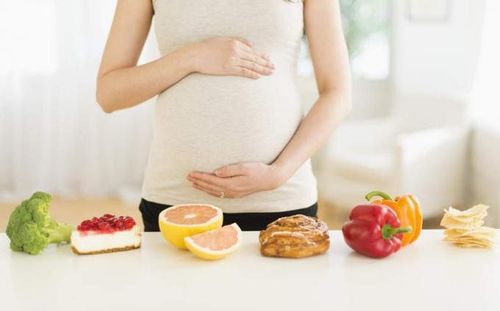This is an automatically translated article.
If you are trying to get pregnant and become a mother, you should start by paying attention to what you eat as your overall nutritional status can affect your hormones and your ability to conceive. Many women have chosen to keep a food diary to track their diet. How about you?
1. Substances to supplement other than vitamins before pregnancy
When you have a goal ahead of you that is pregnancy and you start focusing on making healthy food choices, then try to stick to it. The new US dietary guidelines have recommended that you include these foods in your daily diet:
Should have 5 or more servings of grains and starches, which should include at least three whole grains 2 cups of fruit and 2 and a half cups of vegetables (be sure to eat a variety, such as dark, starchy greens, orange and vitamin C-rich fruits, and dried beans and legumes) beans) 5 to 6 ounces of lean protein from a variety of sources such as fish, poultry, meat, pork, eggs, and legumes. (Limit fish to 12 ounces per week.) Three servings of milk or calcium-rich foods (milk, cheese, yogurt) 6 teaspoons added vegetable fats from healthy plant sources like canola, umami olive, flaxseed, seed oils, or products made from these oils. Avocados and olives are other good sources of healthy fats. Try to avoid trans fats, the "bad" fats found in many fried and fast foods.
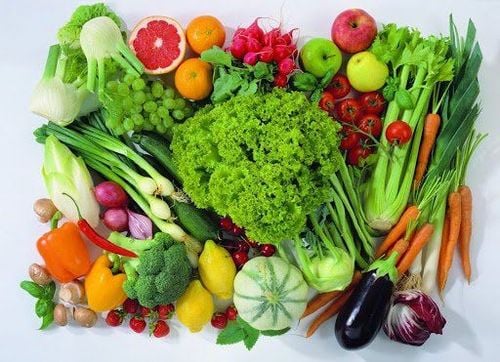
Nên duy trì một thực đơn lành mạnh nếu bạn có ý định mang thai
2. Should megavitamins be taken while trying to conceive?
The answer is no because large amounts of certain vitamins and minerals can actually be harmful to you. If you are trying to get pregnant and you do not want to put yourself or your unborn baby at risk. Fat-soluble vitamins such as vitamins A, D, E and K are stored in the body and can build up to toxic levels if you absorb too much.
Excess vitamin A can cause birth defects as well as headaches, diarrhea, liver and bone damage. And while water-soluble vitamins like B vitamins and vitamin C aren't stored in the body, large amounts of them can still pose health problems. Ideally, you should use 100% of the recommended amount of vitamins and minerals for each vitamin and mineral. Even if you don't take vitamin "megadoses," you could still get more than you need if you eat more than one serving of fortified cereals and other fortified foods each day.
Vitamins and minerals (as well as herbal supplements) are also found in energy drinks and health drinks. You should read product labels carefully to see exactly how much of this vitamin you're getting. The Food and Drug Administration (FDA) does not strictly regulate supplements. Manufacturers are not required to provide FDA with evidence that supplements are effective or safe. Therefore, you need a balanced diet and a multivitamin or prenatal supplement that contains 400mcg of folic acid and 100% of the RDA of other vitamins and nutrients.
3. 5 Nutrients That Can Help Pregnant Women
If you're trying to conceive, you'll want to give your body the best possible chance by making sure you're eating well. Here are five vitamins, minerals and nutrients that have been shown to support fertility that few women may not be eating enough of.
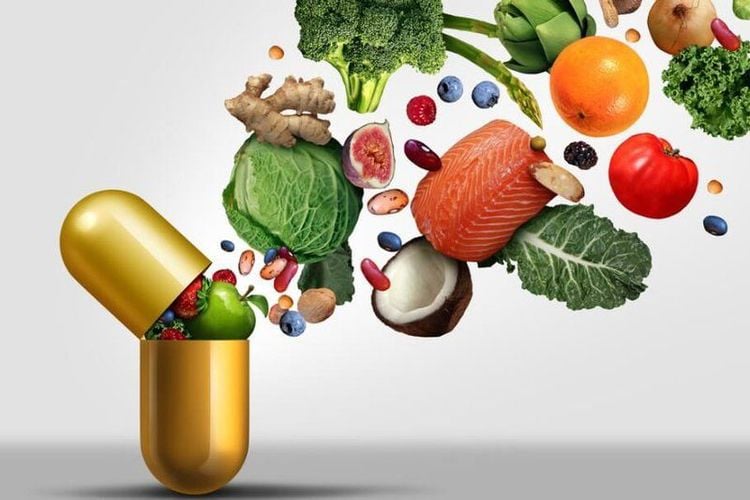
Bạn nên bổ sung những vitamin và khoáng chất có tác dụng hỗ trợ khả năng sinh sản
3.1 Zinc A study from Pennsylvania State University presented last month at the annual meeting of the American Physiological Society concluded that zinc deficiency can have a negative effect on egg development.
This study was done on mice, not humans, but James Hester, lead author of the study and an assistant, says that recent research by himself and others shows zinc as a “regulator of main” of the oocyte (oocyte) develops. It plays a role in oocyte division, fertilization, DNA regulation, and embryonic development.
The need for zinc begins early. Women who are trying to get pregnant all the time should think about getting zinc in the diets of themselves and their husbands, but should also think about a holistic diet and other health factors as well. Zinc is just an important part of the process.
If you are eating a healthy diet and taking supplements, you may not have a zinc deficiency and so you may not need to have your zinc tested. You should discuss micronutrient levels with your gynecologist, especially if you have other risk factors such as unsafe food, digestive disorders or are maintaining an irregular diet. often. The recommended daily intake of zinc is 8 milligrams per day for adult women and 12 milligrams per day during pregnancy and lactation. note that women trying to conceive can take higher amounts, but they should be cautious because too much zinc can interfere with copper absorption and metabolism.
3.2 Choline Choline is a vitamin that up to 90% of Americans don't get enough of. In fact, only 5 to 10 percent of pregnant women meet guidelines for choline intake. Elizabeth Shaw, a registered dietitian from California and co-author, says Choline is essential for promoting health at all stages of life, but is especially important for brain health early in life. and later in life to prevent cognitive decline.
Choline is found in many foods such as egg yolks and lima beans. Shaw says a diet high in meat, whole eggs and green vegetables can help people get enough choline. The recommended daily intake of choline is 550 milligrams per day. Not all prenatal vitamins contain choline.
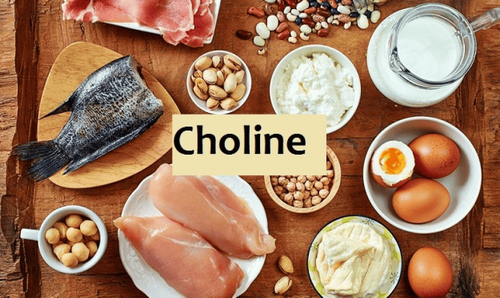
Choline là chất cần thiết để tăng cường sức khỏe ở mọi giai đoạn trong cuộc đời
3.3 Omega-3 Docosahexaenoic acid (DHA) is important for the brain and eye development of babies. A 2016 study in the European Journal of Obstetrics and Gynecology and Reproductive Medicine concluded that consuming omega-3 supplements was associated with a 58% reduction in the likelihood of preterm birth (babies born before 34 weeks) and a 17% reduction in the likelihood of preterm birth. premature birth. (babies born before 37 weeks). The New England Journal of Medicine reported in the same year that a mother's omega-3 intake during the first 3 months of pregnancy reduces the child's risk of asthma and lower respiratory tract infections by about a third. . For pregnant and lactating women, the optimal intake is 700 mg of eicosapentaenoic acid (EPA) and DHA per day, with at least 300 mg of DHA.
3.4 Probiotics Probiotics and prebiotics are both essential in both food and supplement form to promote a healthy gut. There's currently no recommended amount, but Elizabeth Shaw, a registered dietitian from California, recommends increasing your intake slowly. It's not surprising that gut health is involved in fertility.
3.5 Iron This mineral is important for the formation of red blood cells that transport oxygen. Plus, it affects your energy levels, not to mention fertility, say Tammy Lakatos Shames and Lyssie Lakatos, nutritionists in New York City. Women should have their iron levels checked through a blood test. From there, they can determine if they need to increase their intake. According to the National Institutes of Health, adult women should get 18 milligrams per day, 27 milligrams per day during pregnancy, and 9 milligrams per day while breastfeeding. However, you should consult your doctor before taking a prenatal supplement or multivitamin. Women are mostly aware of the importance of iron during pregnancy to prevent anemia, but often don't realize that they need it before conceiving. Low iron levels before conception can lead to lack of ovulation. Taking extra iron while you're trying to get pregnant can help avoid problems with ovulation and help prevent anemia when you're pregnant.
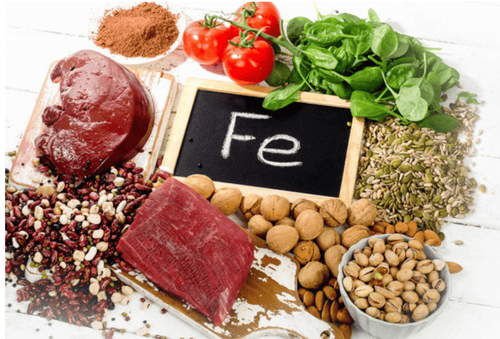
Có thể bổ sung sắt cho cơ thể bằng thực phẩm hoặc vitamin tổng hợp
4. What to eat if you are trying to conceive?
In general, a well-balanced diet is essential in the pre-pregnancy period. Those five nutrients are just part of a healthy eating plan. Prenatal vitamins are not always enough. Stephanie McKercher, a nutritionist from Colorado, said. Many mothers take prenatal vitamins but completely ignore the importance of a balanced diet.
Prenatal vitamins can meet your micronutrient needs, but macronutrients (fats, proteins and carbohydrates) are just as important. Eating a healthy diet and taking iron, folic acid, zinc and vitamin D supplements before giving birth is a must for most women. However, talk to your doctor if you plan to follow a restrictive diet or have other health conditions such as irritable bowel syndrome as you may need additional nutritional support.
You shouldn't rely on just any prenatal vitamins because they don't contain everything you need, like choline and omega-3s. The only exception is that you're buying a select brand that contains omega-3s (of which 300 milligrams is DHA) and choline. The pre-pregnancy period should be considered just as important as the prenatal period for the lifelong health of the infant. Diet choices and maintaining a healthy lifestyle are among the best natural ways to promote reproductive health, says Lizzy Swick, a registered dietitian in New Jersey. Nourishing your body with plenty of fruits and vegetables, whole grains, lean protein and healthy fats, plus taking a prenatal multivitamin is a good way to start.
For more information, please contact the hospitals and clinics of Vinmec Health system nationwide
Please dial HOTLINE for more information or register for an appointment HERE. Download MyVinmec app to make appointments faster and to manage your bookings easily.
Reference sources: babycenter.com, healthline.com






